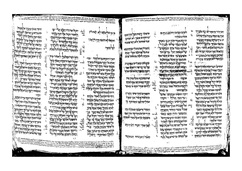Jeremiah 31
| Jeremiah 31 | |
|---|---|
 Book of Jeremiah in Hebrew Bible, MS Sassoon 1053, images 283-315. | |
| Book | Book of Jeremiah |
| Category | Nevi'im |
| Christian Bible part | Old Testament |
| Order in the Christian part | 24 |
Jeremiah 31 is the thirty-first chapter of the Book of Jeremiah in the Hebrew Bible or the Old Testament of the Christian Bible.
Text
- The original text is written in Hebrew language.
- This chapter is divided into 40 verses.
Textual versions
Some most ancient manuscripts containing this chapter in Hebrew language:
- Masoretic Text (10th century)
- Dead Sea Scrolls: (2nd century BC)[1][2]
- 4QJerc (4Q72): extant: verses 1‑9, 11‑14, 19‑23, 25‑26
Ancient translations in Koine Greek:
- Septuagint (3rd century BC; different verse numbering)
- Theodotion version (~AD 180)
Structure
NKJV groups this chapter into:
- Jeremiah 31:1–14 = The Remnant of Israel Saved
- Jeremiah 31:15–21 = Mercy on Ephraim
- Jeremiah 31:22–30 = Future Prosperity of Judah
- Jeremiah 31:31–40 = A New Covenant
Verse 15
- Thus says the Lord:
- “A voice was heard in Ramah,
- Lamentation and bitter weeping,
- Rachel weeping for her children,
- Refusing to be comforted for her children,
- Because they are no more.” (NKJV)[3]
Verse 22
- “How long will you gad about,
- O you backsliding daughter?
- For the Lord has created a new thing in the earth—
- A woman shall encompass a man.” (NKJV)[4]
This phrase is said to be the basis of one part in the Jewish wedding that the bride traditionally walks around the groom three or seven times when she arrives at the Chuppah[5]
Verse 31
- “Behold, the days are coming, says the Lord, when I will make a new covenant with the house of Israel and with the house of Judah—” (NKJV)[6]
- "New covenant": Jeremiah is the only prophet in the Old Testament, who speaks of "the New Covenant that Jesus Christ inaugurated" (Matthew 26:28).[7] While the "Old Covenant" had "come from the very hand of God", accompanied by miracles and wonders on Mount Sinai, the "New Covenant" is accompanied by the "miracle of changed hearts and lives", as the Spirit of God would enter the lives of the people to assure their adherence to the covenant (Jeremiah 31:34, Acts 2).[7]
Verse 38
- “Behold, the days come, saith the Lord, that the city shall be built to the Lord from the tower of Hananeel unto the gate of the corner.” (KJV)[8]
- "Tower of Hananeel": was located at the northeast corner of Jerusalem (Nehemiah 3:1; Nehemiah 12:39; Zechariah 14:10).[7]
- "Gate of the corner" (Corner Gate): was to the northwest of Jerusalem (2 Kings 14:13; Zechariah 14:10), a part of expansion to the northwest side of the city under Uzziah and Hezekiah.[7]
Verse numbering
The order of chapters and verses of the Book of Jeremiah in the English Bibles, Masoretic Text (Hebrew), and Vulgate (Latin), in some places differs from that in Septuagint (LXX, the Greek Bible used in the Eastern Orthodox Church and others) according to Rahlfs or Brenton. The following table is taken with minor adjustments from Brenton's Septuagint, page 971.[9]
The order of CATSS based on Alfred Rahlfs' Septuaginta (1935), differs in some details from Joseph Ziegler's critical edition (1957) in Göttingen LXX. Swete's Introduction mostly agrees with Rahlfs edition (=CATSS).[9]
| Hebrew, Vulgate, English | Rahlfs'LXX (CATSS) | Brenton's LXX |
|---|---|---|
| 31:1-40 | 38:1-34,36,37,35,38-40 | 38:1-40 |
| 48:1-45 | 31:1-45 | |
| 48:45-47 | none |
See also
Notes and references
- ^ Timothy A. J. Jull; Douglas J. Donahue; Magen Broshi; Emanuel Tov (1995). "Radiocarbon Dating of Scrolls and Linen Fragments from the Judean Desert". Radiocarbon. 38 (1): 14. Retrieved 26 November 2014.
- ^ Ulrich 2010, p. 576-578.
- ^ Jeremiah 31:15
- ^ Jeremiah 31:22
- ^ Made in Heaven, A Jewish Wedding Guide by Rabbi Aryeh Kaplan, Moznaim Publishing Company, New York / Jerusalem, 1983, Chapter 19
- ^ Jeremiah 31:31
- ^ a b c d The Nelson Study Bible 1997, p. 1279-1284.
- ^ Jeremiah 31:38
- ^ a b (CCEL - Brenton Jeremiah Appendix)
Bibliography
- The Nelson Study Bible. Thomas Nelson, Inc. 1997. ISBN 9780840715999.
- Ulrich, Eugene, ed. (2010). The Biblical Qumran Scrolls: Transcriptions and Textual Variants. Brill.
